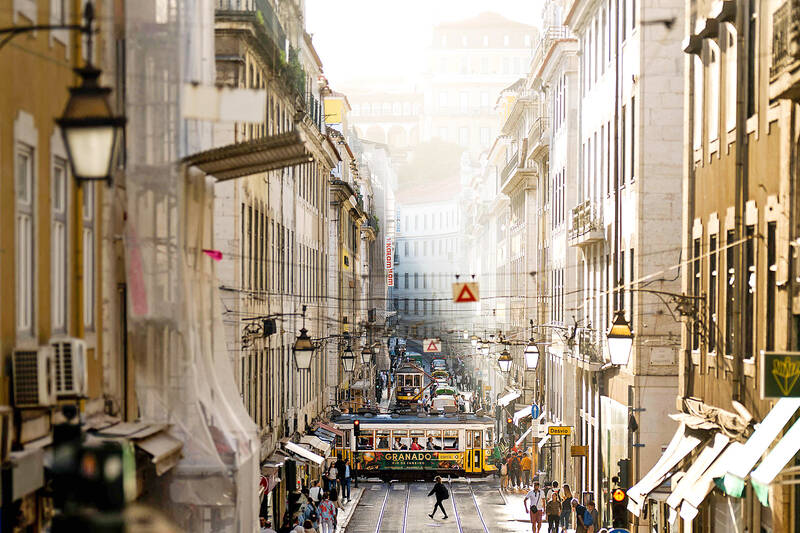An age-old symbol of the Portuguese capital, Lisbon’s rickety yellow trams have become such a magnet for tourists that some locals complain they can no longer grab a ride.
Lisbon began operating trams in the late 19th-century to transport passengers up the steep and narrow streets criss-crossing the hilly old city.
Today’s visitors travel back in time admiring the wooden flooring and old-fashioned appearance of carriages that offer spectacular views of the Tagus River and picturesque pastel-colored buildings.

Photo: AFP
However, as visitors flock to the capital in larger numbers — almost 9 million last year — some residents are growing exasperated with the effects of mass tourism.
“The tram? It’s not for us anymore, it’s reserved for tourists,” said Luisa Costa, a resident of the working-class neighborhood of Mouraria who is in her 60s.
With foreign visitors cramming the carriages, Costa now waits at a stop for electric minibuses put on by Lisbon transport firm Carris for residents who take the same route.
At Martim Moniz square in central Lisbon, passengers sometimes line up for more than an hour at a tram stop on line 28, the most popular route which winds through the most photogenic spots.
Red trams aimed at tourists have also been created, but are less popular due to their higher costs.
Other tram lines have been put back into service after being scrapped during the 20th century with the development of the urban bus network.
Despite the measures, “the situation keeps getting worse,” 82-year-old pensioner Fatima Valente said.
Trams have become “a toy” for tourists to fill their Instagram stories at the expense of residents who “really need” them, journalist Fernanda Cancio wrote in the Diario de Noticias daily earlier this month.
Local associations have for years demanded a more reliable public transport system for both residents and tourists.
Carris secretary-general Ema Favila Vieira conceded that reconciling the needs of tourists and residents “can be difficult,” as the trams are a “much sought-after cultural facility.”
Five historic tram routes connect Lisbon, with a sixth line equipped with longer and more modern carriages running along the river.

‘TERRORIST ATTACK’: The convoy of Brigadier General Hamdi Shukri resulted in the ‘martyrdom of five of our armed forces,’ the Presidential Leadership Council said A blast targeting the convoy of a Saudi Arabian-backed armed group killed five in Yemen’s southern city of Aden and injured the commander of the government-allied unit, officials said on Wednesday. “The treacherous terrorist attack targeting the convoy of Brigadier General Hamdi Shukri, commander of the Second Giants Brigade, resulted in the martyrdom of five of our armed forces heroes and the injury of three others,” Yemen’s Saudi Arabia-backed Presidential Leadership Council said in a statement published by Yemeni news agency Saba. A security source told reporters that a car bomb on the side of the road in the Ja’awla area in

‘SHOCK TACTIC’: The dismissal of Yang mirrors past cases such as Jang Song-thaek, Kim’s uncle, who was executed after being accused of plotting to overthrow his nephew North Korean leader Kim Jong-un has fired his vice premier, compared him to a goat and railed against “incompetent” officials, state media reported yesterday, in a rare and very public broadside against apparatchiks at the opening of a critical factory. Vice Premier Yang Sung-ho was sacked “on the spot,” the state-run Korean Central News Agency said, in a speech in which Kim attacked “irresponsible, rude and incompetent leading officials.” “Please, comrade vice premier, resign by yourself when you can do it on your own before it is too late,” Kim reportedly said. “He is ineligible for an important duty. Put simply, it was

SCAM CLAMPDOWN: About 130 South Korean scam suspects have been sent home since October last year, and 60 more are still waiting for repatriation Dozens of South Koreans allegedly involved in online scams in Cambodia were yesterday returned to South Korea to face investigations in what was the largest group repatriation of Korean criminal suspects from abroad. The 73 South Korean suspects allegedly scammed fellow Koreans out of 48.6 billion won (US$33 million), South Korea said. Upon arrival in South Korea’s Incheon International Airport aboard a chartered plane, the suspects — 65 men and eight women — were sent to police stations. Local TV footage showed the suspects, in handcuffs and wearing masks, being escorted by police officers and boarding buses. They were among about 260 South

A former flight attendant for a Canadian airline posed as a commercial pilot and as a current flight attendant to obtain hundreds of free flights from US airlines, authorities said on Tuesday. Dallas Pokornik, 33, of Toronto, was arrested in Panama after being indicted on wire fraud charges in US federal court in Hawaii in October last year. He pleaded not guilty on Tuesday following his extradition to the US. Pokornik was a flight attendant for a Toronto-based airline from 2017 to 2019, then used fake employee identification from that carrier to obtain tickets reserved for pilots and flight attendants on three other